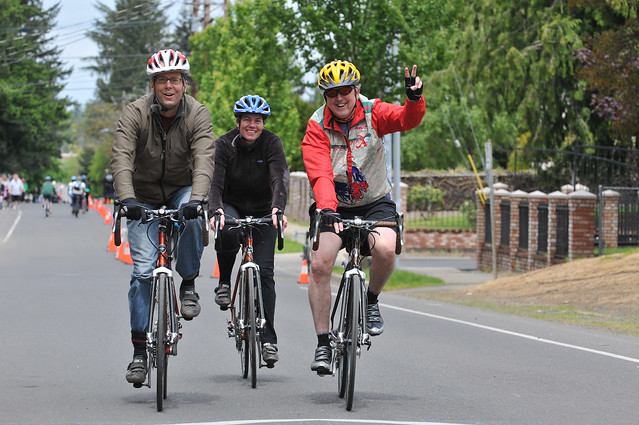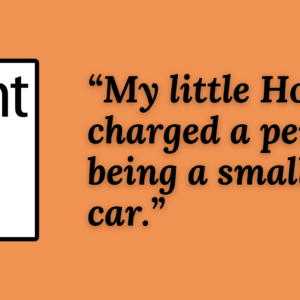There are lots of reasons to have a great time on a bike. Weight loss can sometimes be one of them, but shouldn’t have to be.
So how is it that so many messages about biking get caught up in messages about body type?
That’s the argument from BikePortland reader Anne Hawley, responding to a conversation started by Vancouver, B.C., writer Cecily Walker about whether active transportation advocacy groups should avoid “the ‘obesity’ scare word” when talking up biking and walking.
Several readers had different takes than Walker. This comment from Hawley was a counterpoint to theirs:
Here’s a free tip. If you really do want more people on bikes, then listening to the mainstream message through the ears of people not like you will help you understand the barriers between them and bicycling. It doesn’t matter whether you think those barriers are imagined, or internal, or “misinterpreted” by somebody who doesn’t think the same way you do. Dare to take their statements in anyway. Reflect on them. Consider them. Listen.
If you really don’t want more people (perhaps more people not-like-you) riding bikes, well … carry on, I guess.
I doubt there’s a fat girl alive who has any doubts about the desirability of being thin. I certainly don’t. Anyone who thinks obesity is encouraged or tolerated or celebrated has never been a fat girl.
Advertisement
But as someone who gets around exclusively by bike, I can tell you that the couple hundred calories burned in a short commute or a long errand-run will make approximately zero difference to my body size — and that’s the kind of bike riding I think cities are looking to encourage. Am I fitter than I was before I got on a bike at 55? Certainly. Am I thinner? Only by virtue of other efforts.
So sell me on sustainability, sell me on fun, sell me on freedom, sell me on the gleeful self-satisfaction of it all, but if you try to browbeat me with an obesity scare message that I’ve been browbeaten with all my life, all you do is subtract joy. And yes, sound (TO ME) like a smug a-hole.
Also noteworthy is this reply from Alex Reed, who recently founded a bike advocacy group and wonders if it’s possible to sell biking to politicians as a fitness/health tool without it coming off to the public as something related to fat-shaming. Good question.
Yes, we pay for good comments. We’ll be sending $5 and a little goodie bag to Anne in thanks for this great one. Watch your email!








Thanks for reading.
BikePortland has served this community with independent community journalism since 2005. We rely on subscriptions from readers like you to survive. Your financial support is vital in keeping this valuable resource alive and well.
Please subscribe today to strengthen and expand our work.
Fat shaming and addressing health issues are not the same thing and the latter can occur without the former. It would be irresponsible to ignore the mountain of evidence suggesting that obesity and inactivity lead to cardiovascular disease, diabetes, and other epidemic diseases. If spending 20 minutes a day can address many of these issues, I see no reason not to mention it.
Wanting to be healthy and wanting to be skinny are not the same thing. I support promoting positive body image, but I also support promoting activities that have been shown to increase healthfulness.
The point is that moderate, enjoyable, sustainable activity (such as biking for transportation) is healthy for bodies of any size. It is good for a person to be as active as they can be, without that resulting in any change of body shape or weight. We are trying to tell you our experience: that moderate biking does not equal thinness, and that thinness does not equal health. It is the same as PETA using a “save the whales” message over the image of a headless fat body – talk to some fat vegans and see how wrong that message was.
The problem with focusing on obesity and weight when promoting healthy lifestyles is that it contributes to a false message – more people biking for transportation will eliminate fat bodies. Fat bodies unfairly become a symbol for car culture, greed culture, consumer culture. The weight loss industry is a multi-billion dollar industry that is 100% invested in systematically teaching people to hate their bodies, to feel incomplete and inadequate, and to ultimately fail. Yo-yo dieting, and the kind of extreme weight loss lauded on garbage shows like Biggest Loser, is harder on the body and less healthy than adopting moderate, reasonable lifestyle changes that may or may not result in weight loss. Obesity talk is not about health it is about policing people’s bodies and putting money in the pockets of the weight loss “fitness” industry.
Bottom line – active transportation is good for the health of communities, but those healthy communities will still include fat bodies. Focus on Health At Every (Any) Size, not on weight loss / obesity.
thinness may not equal health, but it is associated with it more than obesity is.
Assuming that being x-50 pounds is healthier for an individual than being x pounds, what does that have to do with biking? 2-3 trips per week, 10 miles or fewer, is most likely not enough to drop 50 pounds long term. Not even 20 lbs, depending on the individual in question. It isn’t enough in my experience, or in the experience of several people who commented on the linked thread or here.
This being true, that moderate cycling isn’t going to make you thin, obesity is irrelevant as a method of recruiting and encouraging new commuters. So, again: Focus on how cycling is healthy for people of any size. Focus on how cycling is safe, freeing and fun. Leave the death-fat scare tactics to mainstream media, diet rags and PETA.
Final point – fat people you meet every day are going about the challenging business of being as healthy as they can be and doing the best they can with what they have, despite constant negative messaging. Another person piling on to say “hey excuse me did you know you’d be healthier [read: more acceptable to me] if you weren’t fat?” is not helpful to that end.
Thanks for the reply. 🙂
Freedom is the reason with the healthfulness and sustainability. At the tail end is the weight. MOST cyclists sometimes actually gain weight initially as fat burns off and is replaced by denser muscle. Muscle is heavier.
As someone who struggled with my weight in my 20s, bike riding did pretty much nothing to help. I mean, it made me feel more in shape for sure. After months and years of daily riding it was a breeze to walk up multiple flights of stairs without breaking a sweat, but I was still fat. If anything, about an hour after my bike ride I’d have an insatiable appetite and end up eating more than had I not rode at all so in some way the exercise was detrimental to my weight loss aspirations. Eventually I realized losing weight is pretty much 100% about eating healthier (and smaller portions) and exercise was actually getting in the way of that by making me crave lots of food after riding. Once I realized that, I shed the weight and have kept it off. I still ride my bike at the coast when I head out there but safety concerns have kept me off my bike in Portland.
I would love for BP to interview you about what keeps you off your bike in Portland. Like an interview series “why I don’t bike in Portland.” Because whatever it is, we have to fix it.
I’m not sure that you can ever convince a ‘scaredy cat’ to ride in the city. I am one of them, by the way. I commuted in Portland and Eugene for many years back in the 80’s and 90’s and survived intact. I now live in Bend, and will not ride in the center of town. Traffic nowadays is more congested, people drive faster and with much less attention. I was hit by a car last year in town (guy was cited for reckless driving doing a most amazing stunt and then hitting me). I would not recommend anyone commute in a major city, unless they have protected lane. Don’t get me wrong, I still ride outside town, love cycling, but the risk/reward ratio just doesn’t work for me.
One of the great things about cycling is that it can be enjoyed on the neighborhood street without breaking a sweat and by the super fit climbing an alpine pass. To promote cycling, we need to put away our ideas of who is or should be cycling. All are should be welcomed and encouraged.
Cycling has many benefits. One of the best is the 6,000 calorie per day weight loss plan that comes with cycle touring. And, the health benefits of cycling outweigh the risk of cycling injury.
Confession and FWIW: When I was in college at UC Santa Barbara and on the cycling team we would do a lot of recruiting on campus to get more people to join us. One of our most successful poster campaigns included the slogan: “EAT ALL YOU WANT AND STILL LOSE WEIGHT – JOIN THE UCSB CYCLING TEAM”
Training’s different. Training’s painful. Even relatively large amounts of non-painful cycling don’t do much for your weight — I lost a quick 15-20 pounds 9 years ago, and have been very steady at 220-225 (6′ tall, so by the book, fat) ever since. This, despite a constant 50 miles per week, now 75, complete with sprinting from lights, on a 65-lb cargo bike.
I did lose a little more on a week-long 300 mile tour, but it came right back afrewerwards. Some summers the distance nudges up to 100 miles per week, I lose a few pounds and get ravenously hungry, and the instant the distance returns to “usual”, so does the weight. All I’m doing is moving my set point around a few pounds.
Pound for pound (see what I did there). Cycling is one of the least productive calorie burning workouts. Years past when I would get injured and couldn’t run, I’d try to pick up the slack by biking more and it was ridiculous how much more I would have to bike. An hour run or an hour bike ride (even a very hilly one) are just not comparable.
You just need to spend a lot of time every week for cycling to be a really effective weight loss (or even maintenance tool).
I will say though that it does add to an overall healthy lifestyle (more activity and less car time) that is very important.
I once read a study (wish I remembered the source) that looked at cyclists who were not loosing weight and getting fitter. They found the level of effort was too low. It turns out that the bicycle is so efficient that you can ride without much effort. Loosing weight and getting fit requires the same level of effort as loosing weight with any other program.
The weight loss equation is calories used > calories consumed. Moving a bike just doesn’t take that many calories, but it can.
I’ve heard lots of cyclists joke that they ride bikes so they can eat and drink more. As I’ve said in replies to a few of the comments, biking can be used for weight loss, absolutely. Cardiovascular and aerobic fitness – building the muscles in your heart and your lungs – is also a byproduct of cycling. Even at low levels cycling burns calories, and that can’t be denied.
But I do see the point that many people here are making. I think there are probably sensible ways to mention the health and potential weight loss benefits without tipping the scale to ‘fat shaming’. Really, there are just so many benefits to bicycling and weight loss doesn’t even rank that high in my opinion (‘specially when you get to my age :). Frankly, I think building sexual endurance is a far better selling point… ;-D
I have lost a considerable amount of weight due to biking and other exercise. Lately, I have been staying at a constant weight, but my muscle percentage has probably doubled and I can eat an insane number of calories and still stay the same weight. Of course, I should eat healthier… but I don’t. If I did, I would be even more fit.
For example, some days I eat a large burrito for lunch and entire large pizza for dinner. But I’m also ~250ish pounds and I burn calories so quickly that if I don’t eat over 3,000 calories a day I feel weak.
Apparently I’m 280 now but a considerable amount of that is muscle. I’m the same size as my friend who’s 240 so I guess it really is true that muscle weighs more than fat
You raise another good point here, which is body types. If I remember right, there are endomorphs, mesomorphs, and ectomorphs. On one end (endomorph?) the person can gain massive amounts of muscle quickly, but has to work to maintain it because fat can also increase, and sustaining energy is a challenge. On the other end (ectomorph, which I think is my type) the person tends to be best suited to endurance athletics. (I spent most of my youth trying to gain weight to no avail; at 6’4″ every gov’t chart under the sun said I was “unhealthy” because I was under “ideal” weight). Mesomorphs tend to have the best of both worlds. They can gain muscle and lose weight relatively easily, and tend to be average or below average height. (This is from memory so I may have mixed things up).
Sounds like you’re an endomorph, if I’ve got that right.
Yeah body type has a lot to do with it. I put on muscle faster than anyone else I’ve ever known.
My weight raises and lowers between 185 and 200 yearly. I am a type 1 diabetic (insulin dependent 5 shots a day). Each year I inch up in the weight by about a pound. Only way to drop weight is to actually manage what I eat and sometimes actually skip an occcational meal while counting each calory, carbohydrate, gram of fat, and protien. It is a lifelong commitment. Anything else is deadly.
Exercise does have beneficial effects on obesity, and cycling is exercise. Cycling is a particularly good exercise for overweight people, because it doesn’t stress the joints much.
It should be particularly noted that the overall metabolism of fit and sedentary people is not the same. Even short periods of regular exercise increase muscle mass and the muscles’ ability to metabolize fat. At rest, muscle is a more metabolically active tissue than adipose tissue, so the benefits are occurring even between bike rides. Big fit muscles burn more fat, 24/7.
All this is true whatever nasty things the childish are saying to each other this week.
Obesity and obesity related diseases are a huge problem in the US. Look up the data on rates and cost of type 2 diabetes, liver disease, cardiovascular disease, premature joint deterioration, etc if you have any doubt about that.
The causes are many fold, the food industry bears much blame, but individual lifestyle choices are a major factor. It will be very, very hard to get this epidemic under control. If the political correctness police make us avoid any utterance that might hurt the feelings of some people who self-identify as obese, then it will be even harder.
Maybe we should censor anti smoking messages for fear of shaming smokers?
Re: the smoking analogy–someone else’s fatness isn’t going to give me lung disease (or any other kind of disease).
It’s assumptions and cultural generalizations about heavier cyclists that can be discouraging. It’s a little like what you experience as a woman in many music gear outlets. In the interests of expediency, I’ve brought a male escort with me in the past as I know he’ll at least get taken seriously and I’m not willing to go through the old routine. Likewise, you may be considered “less serious” or a casual cyclist if you don’t meet the lean ‘n’ mean body image of the ideal–in stores, on the path, on the road. I see this all the time when (for example) a skinny young dude will impatiently dart in front of me after a stop, clearly thinking “gotta get in front, she’ll slow me down.” I try to look extra effortless as I pass him a few seconds later. 😉
Maybe “we” should find something in everybody’s life and criticize it needlessly and hurtfully.
I mean really: how DO you know you’ve made a difference if the target isn’t crying or angry?
It may even be possible that YOU aren’t perfect.
I’m not big on religious quotation but this seems very much like a “let he who is without sin cast the first stone.”
Before you, or anyone else, goes and eviscerates someone else for any private aspects of their personal life that doesn’t impact you in any way make sure you are mythological perfection.
Do we need to distinguish among “obesity”, “overweight”, “sedentary”, and “active”? “Obese” connotes (to me, and I’m not a medical expert at all) some degree of morbidity and disease, while “overweight” sounds “meh”. It would seem that “overweight” + “active” would be healthier than “sedentary” + “any weight” (except for maybe those on an extreme “tortoise”/”120-year” diet of severe calorie restriction and very limited activity). Maybe the strict medical definition of “obese” applies to some very active people who are fit and reasonably healthy, but I myself might be considered to be “overweight” by some, and I would definitely not think of myself as “obese”. Also, for someone my age, I’m probably more fit than many of my peers.
I think what we really have in the U.S. is a “sedentary epidemic”, which can bring on or exacerbate many health problems, including, but not limited to, those that are brought on or exacerbated by being “obese” due to inactivity.
There are distinctions, but it is too much to expect public service or advocacy messages to be full of definitions, footnotes and subparts.
I haven’t seen the data myself, but I’ve been told by a reliable friend whose partner studies the stuff academically that the country’s “obesity problem” is sort of two different problems:
– a steady upward march in the median weight, probably related to increasingly sedentary lifestyles and the centuries-long decline in the cost of calories
– a rapidly increasing but far smaller population of people who are far overweight, which seems to be tied not much to physical activity but to unknown environmental factors that are for some reason more closely linked to poverty in urban areas than they are in rural areas
It was an interesting angle on this stuff and I’d love to learn more some time.
I agree with those who have stated that being healthy and being “skinny” are not the same thing. I have known a good number of people who I consider to be more healthy than me (they eat better and get more exercise), but because of their body particulars, are larger in some way or another. Being healthy is the important component here, and that is what will help prevent some of the above listed “obesity-related” diseases.
I think the real questions are: what does it mean to be healthy, and what does it take to achieve that?
This is the subject of debate among many professionals, still, and also is different for every person based on their own physical and medical needs. To generalize, though, it typically requires balance of some kind between physical exercise and good diet. Even within those categories, balance is required. Riding a bike CAN provide good cardiovascular exercise, when done in a manner that promotes it. Snoozing along at 5-10 mph on a road bike will net you little more than sitting on the couch (unless you’re climbing the west hills), but a half hour of getting your heart really moving per day is a sort of minimum to start promoting healthfullness. Then, there are things like stretching, using weights or body weight resistance training that help build healthy muscles and joints. All of these things together promote good physical health.
And as for diet, eating pizza, hamburgers, french fries, and so on will not help you to be healthy (or lose weight either). A balanced diet includes all manner of proteins, fats, and carbohydrates taken in more whole forms such as fruits, vegetables, dairy and whole grains. Processed foods and empty starches add little nutritional value to one’s diet, and actually promote the onset of cardiovascular and other diseases like diabetes. It takes the right kind of balance (again, different for men and women and all people) of these foods to have a healthy diet. Even what time of day you eat how much food can make a difference as to how it is processed and absorbed by the body.
At the end of the day, there is no silver bullet for what it takes to be healthy. It takes conscience effort and listening to your body about how it feels, as well as educated decisions and planning to really be in tip-top shape. Our school systems have a lot of mis-education (and non-education) on this topic, and science is also lacking in a lot of ways to help us understand what really is healthy and what we really should be doing to be healthy. This doesn’t mean we can’t try, and be supportive of each other in trying. The body type ideals sold to us by the media are not part of promoting real, good health. They are designed to create sexual symbols which appeal to us so we buy whatever product they are trying to sell. It’s hard to look past these images when we are so inundated by them, and so too often they become part of a dialogue about health whether we intend it or not.
There is another aspect to health too which hasn’t even been touched on – mental health. It at least affects if not effects our physical health as well, though I think the whole topic is maybe a different discussion. It isn’t to be discounted when considering the full spectrum of what it means to be healthy, though. And FWIW, biking can help with this aspect as well.
Anyway, sorry for such a long post, thanks for reading.
Anyone who is claiming that X is or is not beneficial for healthy individuals has failed to understand that the vast majority of clinical research does not study healthy individuals. Also, and in my very strong opinion, health advice in blog comments should be taken with a very big grain of salt.
There’s more to fitness than thinness or weight. My health is vastly better since I started bike commuting 8 years ago, particularly my back health. I used to have regular back pain and it was my chiropractor that told me I needed regular aerobic exercise to strengthen my core – biking did that for me.
Depression is definitely way, way better with a bike commute too. I can wake up with the lowest of outlooks, but that bike commute really charges me up most days.
I did actually drop 25 pounds (from my lifetime high) through biking alone in the first three years but it plateaued after that. I then dropped almost a couple dozen more pounds with a change in diet. That said, going from a 5 mile, each way, commute to a 3 mile one a few years ago, I can pinpoint the date of the move on my weight graph where my weight did climb up about 15-20 pounds from he loss of range on the daily commute.
Sounds like another case of everybody being offended about everything.
Been offline a lot the last few days and completely missed this! Thanks for the Comment of the Week honors, Jonathan and Michael.
Obviously it’s a fraught subject. Cecily, the author of the featured blog post, said on Twitter that she regretted looking at the BikePortland comments, implying a general lack of empathy. I know how she feels. Replies to my comment last week, and here again, demonstrate an intense interest in the problem of obesity–and a seemingly willful disregard for what Cecily was talking about.
To wit: that trying to sell bicycling with an anti-obesity message is only going to make fat people feel unwelcome in the club. You don’t have to be fat for long in this world to know that you’re unwelcome in most clubs. Taking up cycling under those conditions is an act of significant defiance and courage. If we do it at all, it’s despite and not because of the message.
Nobody’s questioning the statistical correlation between obesity and health risks. Nobody, not even the loudest Fat Acceptance activist, is claiming that the statistics are universally incorrect, or that the fatter you get, the healthier you are. If you’re not a fat person yourself, you’ll just have to accept my intelligent, college-educated, world-travelled, and long-lived word on the subject: WE KNOW. No message has ever been made clearer in our whole lives.
So everyone who takes the trouble to point out that obesity is associated with health risks in a forum like this is basically wasting keystrokes and contributing to the actual problem Cecily was talking about in the first place.